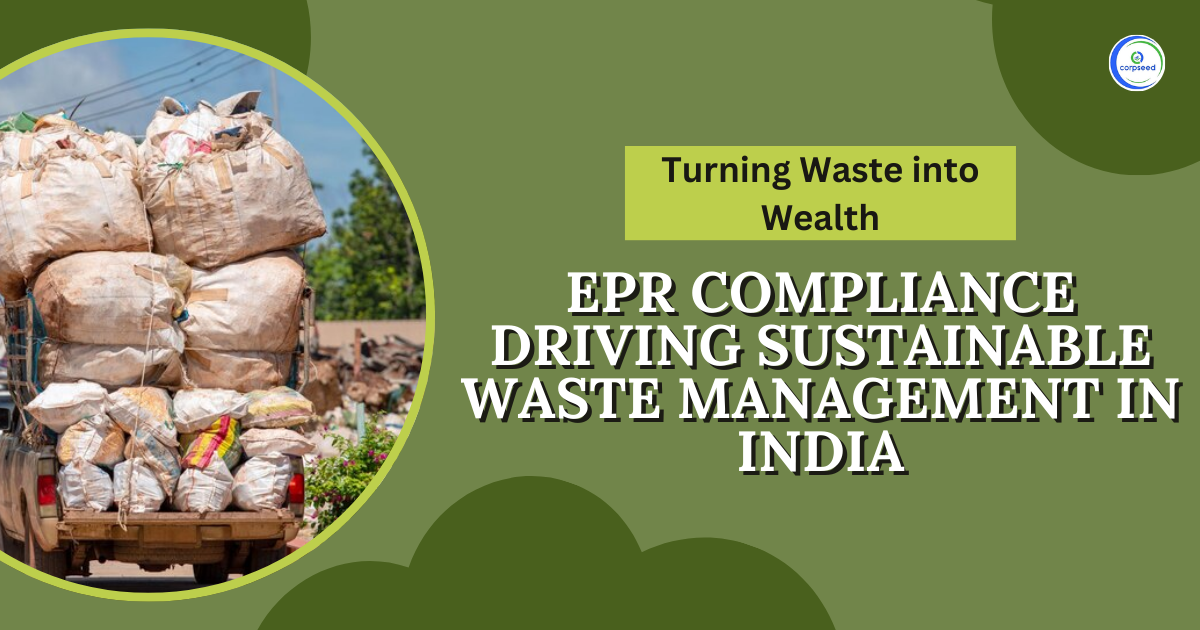Little efforts can have a big impact. It's time to start recycling your e-waste now!
E-Waste: A Problem or an Opportunity?
E-waste is a colloquial term for electronic items that have reached the end of their "useful life." Electronic devices such as air conditioners, refrigerators, LED/LCD, laptops, desktops, monitors, televisions, and mobile phones, as well as their spare parts and accessories, are prevalent. Many of these items can be reused or recycled. E-waste contains precious resources including Aluminium, copper, gold, palladium, and silver, as well as hazardous ones like cadmium, lead, and mercury.
Table of Contents
--------------Blog Contact Form-------------
Electrical and Electrical Equipment Includes the Following:
- IT and communication equipment.
- Consumer electricals and electronics such as TVs, washing machines, refrigerators, Air conditioners including fluorescent and other mercury-containing lamps.
Computer equipment accounts for almost 70 percent of e-waste in India, followed by telecom/phones (12 percent), electrical equipment (8 percent), and medical equipment (7 percent).
The world's fastest-growing waste stream is due to humankind’s insatiable demand for electronic devices. The electronics industry's achievement in creating a broad consumer market for computers, cell phones, and other personal electronic equipment has been tremendous over the last decade. Some forms are multiplying at an exponential rate. While more technological devices contribute to the problem, they can also contribute to the solution.
If we get it right, we'll see a lot less of our valuable minerals, metals, and resources thrown away. The benefits to industry and workers, as well as human and environmental health, might be significant. It is critical that we adopt a more circular mindset for e-waste management as soon as possible.
Introduction to Extended Producer Responsibility (EPR):
Extended Producer Responsibility (EPR) is a legal technique used by developed countries to encourage and promote electronic and polymer waste reuse, recycling, and environmentally responsible disposal. The manufacturer of the goods is responsible for disposing of this trash under EPR. EPR regulations are in place to guarantee that manufacturers and producers take responsibility for reducing the waste generated by their products.
When a product reaches the end of its life cycle, the manufacturer is required to collect the waste generated by the product.
This can be accomplished by supporting the collection (take-back process) of waste generated after the consumption of their products or by encouraging the eco-friendliest recycling of such products. Recycling should only be done or allocated to recyclers who are registered with the local pollution control committee or board.
EPRs are given by the Central Pollution Control Board (CPCB) to manufacturers of e-waste, plastic waste, and polymer waste, as well as bulk users of these wastes.
According to a recent report by the Central Pollution Control Board, India recovered only 10% of the predicted electronic waste (e-waste) created in 2018-19 and 3.5 percent of that generated in 2017-18.
According to the data, India created 708,445 tonnes of e-waste in 2017-18 and 771,215 tonnes the following year. The amount increased by 32% to 1,014,961 tonnes in 2019-20.
The estimates are based on the E-Waste Management Rules of 2016, which specify 21 different types of electrical and electronic equipment. Computer displays, cellphones, chargers, motherboards, headphones, and television sets are among the items discarded.
The collection targets for 2017-18 and 2018-19, based on the guidelines, were 35,422 tonnes and 1, 54, 242 tonnes, respectively, according to the report published on December 18, 2020.
In both years, however, actual collection was lower – 25,325 tonnes in 2017-18 and 78,281 tonnes in 2018-19.
According to the guidelines, electronic product makers are responsible for collecting end-of-life electronic products as part of the Extended Producer Responsibility, which is in line with global best practices.
Global E-waste statistics:
Globally, the amount of e-waste generated has been gradually increasing since 2010. By 2019, 53.6 million metric tonnes had been produced. This was a 44.4 million metric tonnes growth in just five years. Only 17.4 percent of the material was verified as being collected and correctly recycled.
China is the world's largest producer of electronic waste, with over 10 million metric tonnes produced in 2019. The United States came in second, with around seven million metric tonnes produced. In 2019, roughly 54 million metric tonnes of e-waste were generated globally, with this number likely to rise in the future years.
Every year, Singapore creates roughly 60,000 tonnes of e-waste. That equates to nearly 70 mobile phones being discarded per person in Singapore! With more spending power and new technology constantly replacing old ones, this number is anticipated to rise.
Singapore is working towards proper disposal of e-waste while also monitoring the flow of electronic products through the economy. The country will soon have a new electronic and electrical trash collection system, which will include public receptacles, regular collection drives, and ad-hoc doorstep collection services as part of the extended producer responsibility scheme (EPR) for electronic and electrical waste (e-waste) management. When electronic devices enter the Singapore market, the company will keep track of them and guarantee that they are properly treated when they become waste.
Why was EPR introduced in India?
The E-Waste (Management) Rules, 2016 the Plastic Waste Management Rules, 2016, and the Solid Waste Management Rules, 2016 are comparable to India's first EPR-based legislation, the Batteries (Management and Handling) Regulations, 2001 in terms of the "extended producer obligation" idea. One of the main reasons for the failure of BMHR was the lack of recent rules to reflect the role of the broad informal sector in the collection and recycling of solid trash.
To solve this drawback, an EPR process was implemented, combining the informal collecting system with formal recycling and removing informal recycling units.
Applicability of EPR on E-Waste:
EPR Authorization is applicable to producers, manufacturers, bulk users, importers, recyclers, dismantlers, and collection centers of electric and electronic equipment waste.
Extended Producer Responsibility is Applicable on the following:
1. Bulk consumer includes central government or government agencies, public sector companies, banks, educational institutions, international organizations, international agencies, partnerships, and public or private companies registered under the Factories Act of 1948 (63 of 1948) and the Companies Act of 2013 (18 of 2013), as well as health care providers with a turnover of more than one crore or more than 20 employees;
2. Collection Center means a center or collection point or both established by the producer individually or as an association to collect e-waste in order to channel the e-waste to the recycler and to play the role stated in the producer's Extended Producer Authorization and have facilities in compliance with the guidelines of the Central Pollution Control Board, including the collection center formed by the dismantler or recycler, which should form part of their authorization issued by the State Pollution Control Board where the facilities are situated;
3. Dealer means any individual or company that purchases or receives electrical and electronic equipment and its components or consumables or parts or spare parts from producers for sale as listed in Schedule I of these Rules;
4. E-retailer means a person or business organization that uses the Internet, telephone, or electronic network to sell its goods;
5. Manufacturer means an individual organization or business as specified in the Companies Act, 2013 (2013) or business as specified in the Factories Act, 1948 (1948) or Small and Medium Enterprises as defined in the Micro, Small, and Medium Enterprises Development Act, 2006 (2006), which has electrical and electronic equipment manufacturing facilities.
6. Producer means any person who, irrespective of the selling technique used, such as distributor, seller, e-retailer, etc.;
- manufactures and offers to sell electrical and electronic equipment and its components or consumables or parts or spare parts under its own brand; or
- offers to sell electrical and electronic equipment assembled under its own name, and its components or consumables or parts or spare parts manufactured by other manufacturers or suppliers; or
- offers to sell imported electrical and electronic equipment and its components or consumables or parts or spare parts;
7. Recycler means any individual engaged in the recycling and reprocessing of electrical and electronic waste equipment or assemblies or components thereof and having facilities as laid down in the Central Pollution Control Board guidelines;
8. Refurbisher means any company or undertaking registered under the Factories Act, 1948 or the Companies Act, 1956 or both or district industrial centers engaged in the refurbishment of used electrical and electronic equipment for the purposes of those rules.
Thus, it Can be Said that EPR for E-waste is applicable on:
- Producer of electrical and electronic equipment or plastic.
- A bulk user of electrical and electronic equipment.
- Bulk importer of electrical and electronic equipment.
- Recycler, dismantler, refurbish, or collection centers of e-waste.
According to a recent notice from the Central Pollution Control Board (‘CPCB'), all makers of electronic and electrical equipment must get Extended Producers' Responsibility-Authorization (EPR authorization) from the CPCB under the E-waste Management Rules, 2016. It can be obtained by filling out Form 1 and submitting it.
Authorization is essential to ensure that end-of-life EEE generated by the producers' products is channeled to authorized dismantlers/recyclers.
As per the recent notice by the Central Pollution Control Board (‘CPCB’) has emphasized the requirement for all producers of electronic and electrical equipment under e-waste Management rules, 2016 to obtain extended producers’ responsibility (EPR authorization) from CPCB. It can be obtained after applying in form-1.
Authorization is needed to be obtained to ensure that end-of-life EEE generated from the products of the producers are canalized to authorized dismantlers/recyclers.
What are the advantages of EPR Authorization?
Extended producer responsibility is frequently mentioned as a strategy to combat planned obsolescence since it financially incentivizes producers to design for recycling and make products live longer. In addition to combating planned obsolescence, the pressures placed on governments may be lessened by shifting a portion of the financial burden for paying and managing garbage to the maker.
Many governments are currently shouldering the burden of waste disposal and spending millions of dollars on waste collection and removal. These plans, on the other hand, frequently fail because governments lack the financial resources to effectively develop and implement them. Placing responsibility for product disposal on manufacturers might allow governments more leeway in crafting legislation that favors sustainability at a low cost to both sides, while also raising awareness of the challenges that EPR tries to address.
One of the benefits of EPR is that when the policy puts pressure on countries that export E-waste, it becomes more and more effective. The regulation of E-waste pushes infrastructure to either deal with the waste or adopt new ways for producers to create items. As more countries embrace these measures, it becomes more difficult for others to ignore the difficulties. When China stopped importing E-waste from the United States, for example, garbage piled up at ports. Because of the ability to export and the neglect of producers, the lack of infrastructure around recycling E-waste in the United States has been possible.
The pressure from this expanding dump of e-waste drives countries to build their own infrastructure and will force the government, both state and federal, to impose greater regulations on companies.
What are the Documents Required for E-waste EPR Authorization?
- CIN Certificate.
- MOA (1st,2nd, and last page).
- GST certificate.
- Rent Agreement.
- Aadhaar Card and PAN card of the authorized signatory.
- Board declaration for authorized signatory.
- EC Code (Only in case of imports).
- Letter Head in the original.
- Product Details mentioning year-wise import (expected/actual).
- A booklet containing product details (soft copy).
- Letterhead (pdf format).
- Quantity of products placed in the Indian market (Year Wise).
- URL of Companies Website.
- Toll-Free No of the Company.
- Details of Collection Center(s)
Procedure for Obtaining EPR Authorization:
- Identifying the applicability and eligibility of the establishment.
- Preparing the drafts, EPR plan and Budget required filing of the application.
- Preparing of draft applications and respective attachments.
- Submission of Application in CPCB.
- Clarifying the remarks if raised by the department.
- Obtaining of registration certificate.
Conclusion:
To sum up, it can be said that it is not just a question of environmental policy, but it is also the most effective way of obtaining higher environmental standards in product design by transferring responsibility to manufacturers as polluters. A producer's commitment to assist a reverse collection method and recycling of end-of-life, post-consumer waste is known as Extended Producer Responsibility (EPR). The goal is to bring it back into the system in order to recover resources from the waste.
This portion of the site is for informational purposes only. The content is not legal advice. The statements and opinions are the expression of author, not corpseed, and have not been evaluated by corpseed for accuracy, completeness, or changes in the law.
BOOK A FREE CONSULTATION
Get help from an experienced legal adviser. Schedule your consultation at a time that works for you and it's absolutely FREE.




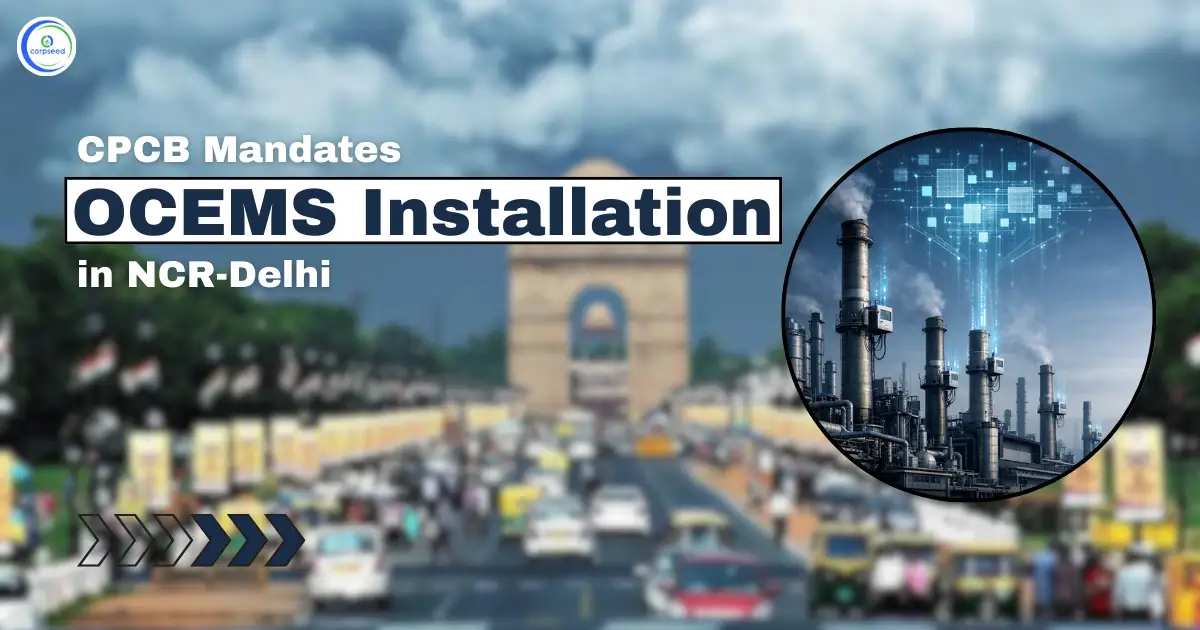
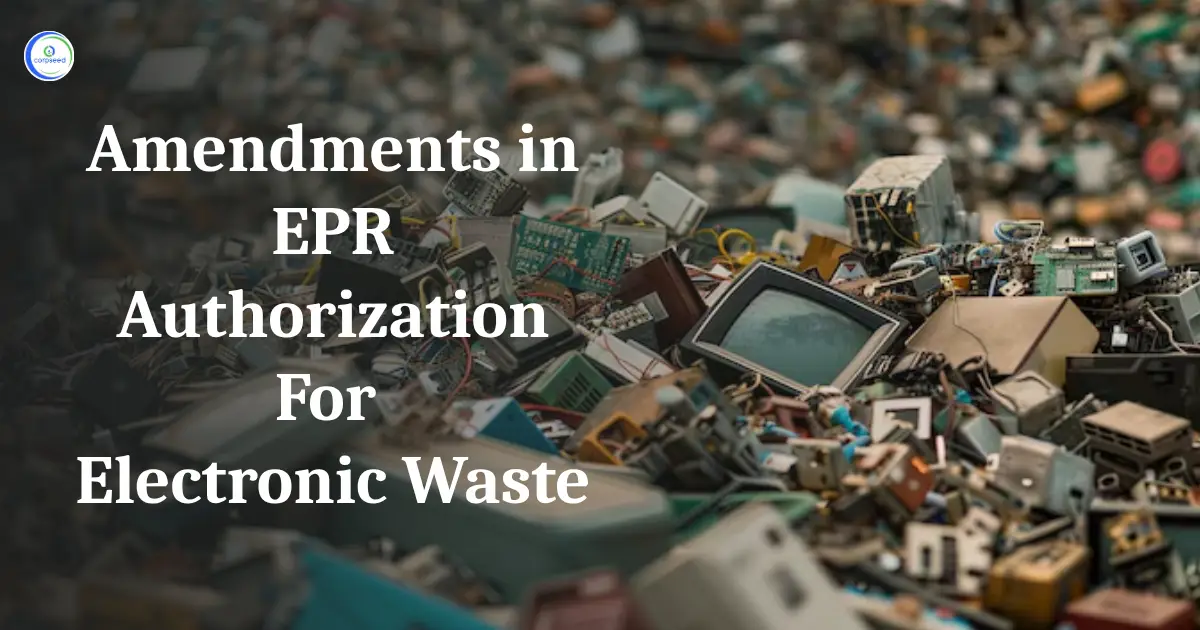
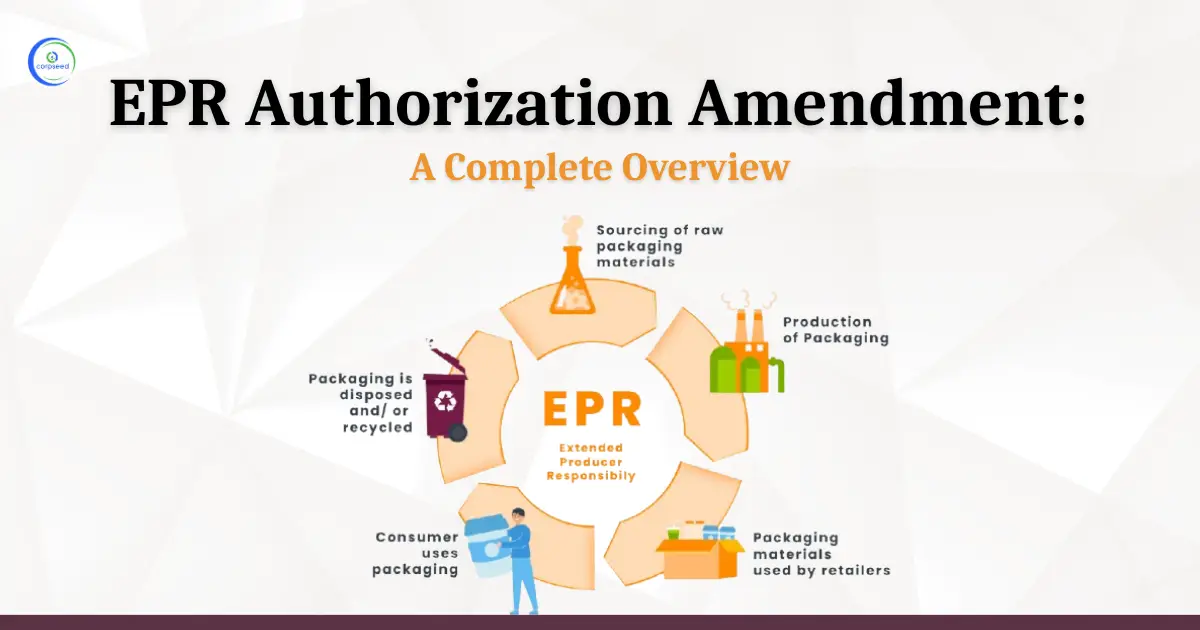
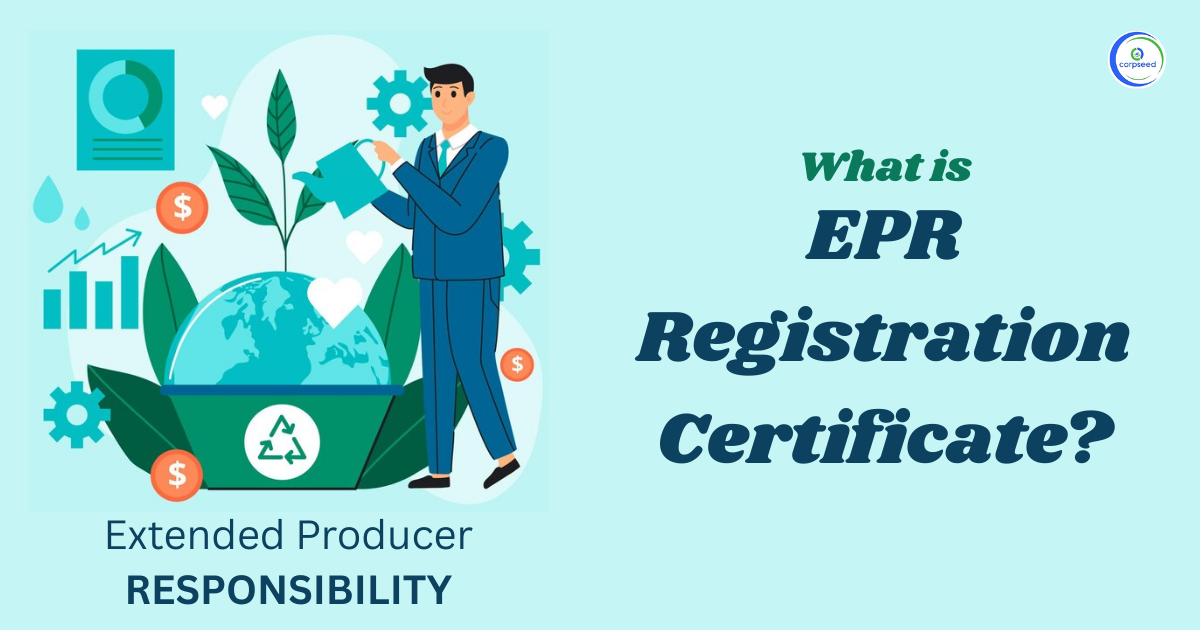
.webp)
